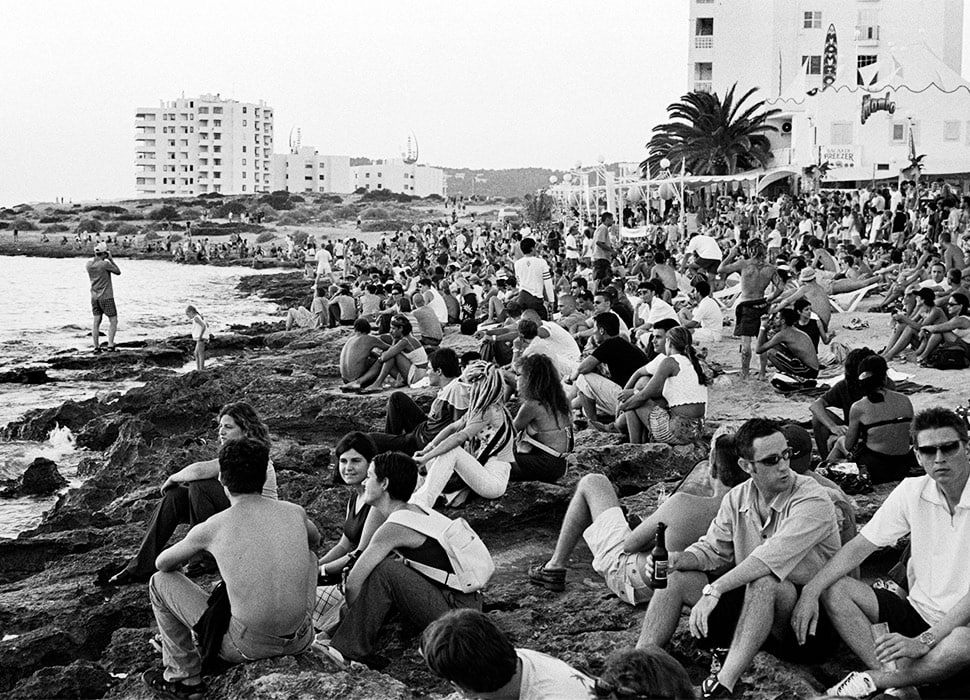In the summer of 1980, the sun was doing what it has done for the past five million years or so: setting with a satisfying dip into the Mediterranean. On the western shore of Ibiza, just outside San Antonio, which was then little more than a village, a small crowd at the newly opened Café del Mar was watching the sunset while ambient music played by the rocky shore.
Forty wild Ibizan seasons later (and one, 2020, a bit less so), the same scene is still unfolding. Café del Mar is still playing chillout tunes against a golden backdrop. It still feels like an oasis of tranquillity in a desert of madness. When the sun finally vanishes, a polite applause ripples up the beach. Today the appreciation for the sun’s good work isn’t quite what it used to be – perhaps because phones and selfies make clapping one-handed too difficult – but for many, sundowners at Café del Mar remain a fundamental part of a trip to Ibiza.
The sunsets on the west side of Ibiza are notably beautiful
The music has grown and expanded now – Café del Mar’s relaxed beats are a subgenre all of their own. To some, the Ibiza of the mid-90s is now unrecognisable, but the Café has remained a place to come and relax before the latest parties resume after sunset. Even today, for many, it’s the very first or very last place to have a drink on the island.
Here, we speak with three of the insiders – the regular, the DJ and the waiter – who’ve kept the venue going over the decades with their patronage and passion for music. No matter what else changes, the sun will always set at Café del Mar.
THE DJ: José Padilla
The legendary José Padilla, who died in October 2020 / Image: Getty Images
‘The art of playing Café del Mar is timing your set so the last line, the very last note of your best track, fades out just as the sun vanishes over the horizon. People would ask me how I did it, day after day. “You must use a watch!” they said. No. I did it by feel. That, and a lot of practice.
‘I first took up my residency at Café del Mar in 1991, but I’d known the founders since day one. In the early days I was DJing at other clubs around the island, but I gave the Café del Mar guys cassettes to play – so even when I wasn’t actually present, I was still there in spirit. Even with my residency I needed cash, so I made extra selling compilation tapes on the side. I could sell 100 a day just from behind the bar, to people who wanted a souvenir of their time at Café del Mar, and to those who just loved great music. Even today I get messages from people who still own, and listen to those tapes.
‘I think “Balearic” as a musical genre is so hard to pin down because we only ever had a few records – 200 or so – that we had to eke out all night, every night of the week. You couldn’t just rely on bangers, or one niche genre like you maybe can today. Every set was a journey. The Café del Mar crowd was always open minded – they would listen, even if they didn’t know, or understand what the track was about.
‘Anybody who was anybody in the music scene would congregate at the venue. Guys from the States, people from all over. And we had lots of characters. There was Prince, from Camden, who would cut people’s hair on the terrace for a few quid, and Martin the poet, who would sit and write, always dressed up in his impeccable English gentleman suit. It wasn’t as hippy as some people seem to think, but there was always a warm and friendly vibe.
‘Being labelled ‘the king of chillout’ is nice, I suppose. I’m happy to have helped create a genre – though credit where credit is due, Mixmaster Morris was also a big part of it. To be honest, though, this reputation of being the godfather or whatever hasn’t helped me too much from a business point of view. Chillout doesn’t get nearly as many bookings, or pay half as well as house music does. Still, when it was good at Café del Mar it was great. The best years of my life.’
José Padilla, 1955 – 2020




